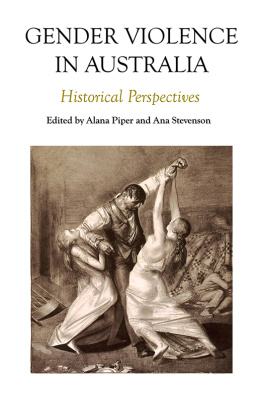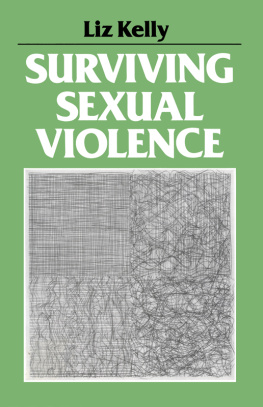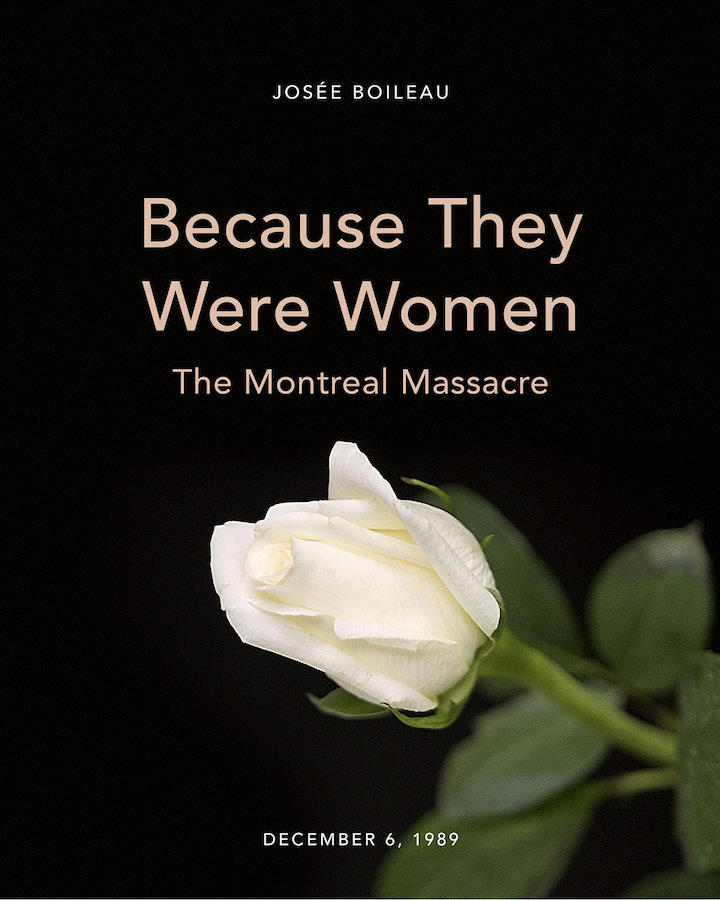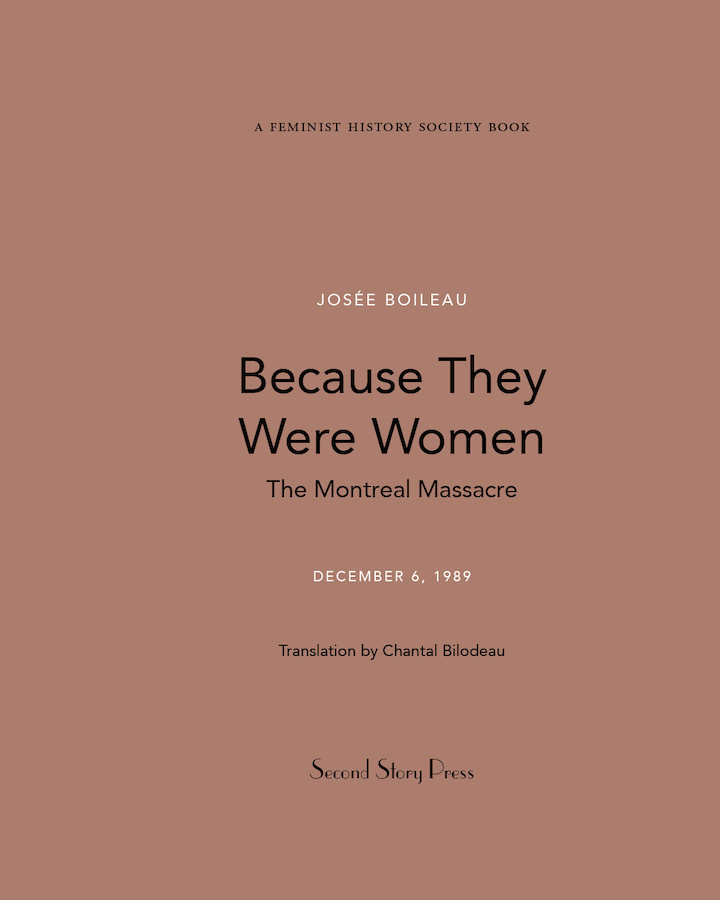Because They Were Women
The Montreal Massacre
Library and Archives Canada Cataloguing in Publication
Title: Because they were women : the Montreal Massacre / Jose Boileau ; translated by Chantal Bilodeau.
Other titles: Ce jour-l. English
Names: Boileau, Jose, 1962- author. | Bilodeau, Chantal, 1968- translator.
Description: Series statement: A Feminist History Society book | Translation of: Ce jour-l.
Identifiers: Canadiana (print) 2020021165X | Canadiana (ebook) 20200211668 |
ISBN 9781772601428 (softcover) | ISBN 9781772601435 (HTML)
Subjects: CSH: Montral cole Polytechnique Women Students Massacre, Montral, Qubec, 1989. | LCSH: Mass murderQubec (Province)Montral.
Classification: LCC HV6535.C33 M65 2020 | DDC 364.152/340971428dc23
Original title: Ce jour-l. Parce quelles taient des femmes
Copyright Les ditions La Presse
All rights reserved
Published under arrangement with Les ditions La Presse, Montreal, QC, Canada
English-language translation copyright 2020 Second Story Press
https://feministhistories.ca/
Original design by Simon LArchevque
Cover photo Jacques Nadeau
Printed and bound in Canada
Second Story Press gratefully acknowledges the support of the Ontario Arts Council and the Canada Council for the Arts for our publishing program. We acknowledge the financial support of the Government of Canada through the Canada Book Fund.
Published by
Second Story Press
20 Maud Street, Suite 401
Toronto, ON M5V 2M5
www.secondstorypress.ca
CONTENTS
December 6, 1989
Quebec, at that time
The young women
Photo credits
List of acronyms and abbreviations
Preface
Catherine Bergeron
Memory is often silent , as if dozing off lulled by the warmth of a wood stove. But, every once in a while, it wants to talk. It wants to tell stories and histories. Because sooner or later, memory needs to be shared.
One day, there was the Comit Mmoire.
It was in 2014, the day after the ceremony marking the 25 th anniversary of Montreals cole Polytechnique massacre. I remember someone said: They can never be forgotten. They. The fourteen young women killed because they were women.
Thats when a handful of volunteers from diverse backgrounds coalesced into a committee. Ever since, every December 6, like a ritual, the Comit Mmoire holds a commemorative ceremony in collaboration with the City of Montreal, Polytechnique Montral, and Moment Factory.
Memory is important. I find that it allows us to make the journey into the past and come back to the present with a bit more peace.
One day, there was the idea.
It would have been easy to mark the 30 th anniversary of the Polytechnique massacre with more flowers, more speeches, more prayers, and more beams of light. But why not [with] more soul? suggested Jacques Duchesneau. Thats how this book came into being.
I must thank this former chief of police for being the driving force behind this book. He was the first to imagine the portraits that would allow us to (re)discover what Anne-Marie Edward, Sonia Pelletier, Maryse Leclair, Barbara Daigneault, Maud Haviernick, Michle Richard, Anne-Marie Lemay, Annie Turcotte, Hlne Colgan, Nathalie Croteau, Annie St-Arneault, Maryse Laganire, Barbara Klucznik-Widajewicz, and my sister Genevive Bergeron were and could have been.
I applaud his tenacity and his compassionate desire to paint the young women not just as victims, but also as people with habits, talents, loves, favorite sports, and dreamsall those human things that fill our ordinary and extraordinary days. Ill also let you in on a secret about my friend Jacques: it took him twenty years after the massacre to muster the strength to go back to Polytechnique. This book is a balm. For him as much as for me.
This book is also a necessity. It would have been unthinkable for it not to come into existence. It is a necessity because it locates December 6, 1989 within history and leaves a trace for future generations. Its a way to pass the torch. A way to pay tribute to the young women who have inspired so many people and who, from where they are now, urge us to carefully guard the place of women in society.
One day, there was the author.
Youll like Jose Boileaus words. No one but her could have taken us so expertly to the place where the personal and the historical meet. A journalist for over thirty years, who has worked for some of the most important media in Quebecincluding as a columnist and editor-in-chief of Le Devoir Jose has shown that we dont need answers so much as we need to tell.
She wrote with an open heart, a transmitter of memories offering us the opportunity to dive right into the heart of the before and after Polytechnique. Her views on the event, on feminism, and on society call for a new awareness. As she makes abundantly clear, the first pages of this tragedy were written well before that fateful December 6, 1989.
I deeply admire Jose. Her portraits of the victims also say a lot about us.
One day, there was everyone else.
The Polytechnique tragedy split my life in two: before and after the death of my sister. Before and after my missing her. For the last thirty years, I have kept alive the memory of those who have left us as a way to tie these two pieces together. Many others have done the samefamilies and friends, and also people moved by the massacre. Death has this amazing power to bring communities together in solidarity.
Youll stay; well never lose touch, we told them. We wanted to continue the conversation with the deceased. Now this book will ensure that this happens.
I want to thank the voluntary members of the Comit Mmoire for their efforts in bringing this literary project to fruition: Jacques Duchesneau, Michel Petit, Romain A. Gayet, Annie-Clara Gravel, Florence Scanvic, Jonathan Landry-Leclerc, and Martine Robert. Thank you also to Andr Tessier.
Instead of urging us to ask why these fourteen young women have gone, they tried to remind us why they came.
I give a warm hug to the families and relatives of the victims, who graciously agreed to be interviewed, who dug through their photos and revisited their memories to allow this book to exist and touch us. This visit to the past is such a gift to our society.
My thoughts also go to all the injured, to the paramedics, the police officers, and the personnel of Polytechnique who lived through that day and are forever linked to the memory of this book.
Good-bye, my fourteen friends.
And though you and I, dear readers, are not them, we are definitely made of them.
Carpe diem.











